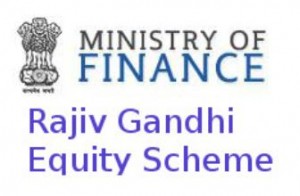How to save tax? It is a common question put forward by every tax payer to his accountant as the end of every fiscal year approaches.

However, it’s your take how you rate the scheme after reading the analysis.
Positive 1—RGESS is a scheme that is specifically drafted for a new investor (Indian national) without an equity investment ever before 23rd November, 2012.
Negative 1— Only new investors with gross total income less than or equal to 10 lakh can avail the benefit and not the existing ones.
Positive 2—They can put up to Rs 50,000 in the scheme and avail a maximum of 50% deduction on the amount invested. For example, if a person is taxed at 10% he saves tax of Rs 2,500 and similarly Rs 5,000 for 20% tax bracket.
Negative 2—The benefit amounts to a mere Rs 2,500 to Rs 5,000 at maximum. It is too undersized to attract an equity investor.
Positive3—The investment is locked-in for a total of three years in complete safety. The investor could invest in RGESS as many times in the initial year of the investment.
Negative 3—However, the investor could only avail tax benefits in the beginning year (the first year possesses a fixed-lock in) and no benefits could be cashed upon in the subsequent two years of the scheme.
Positive 4—The latter two years have flexible lock-in feature. During the flexible-lock in period, the investor can rework on his portfolio carried from the first year.
Negative 4—Conversely, the value of securities present in the demat account should be equal to the amount of the investment stated in the first year for a cumulative period of 270 days each year of the scheme. Otherwise all the tax benefits cease to exist.
Positive 5—A first time investor could invest in any stock belonging to BSE 100 or NSE CNX 100, equities of top notch PSU’s, FPO of such shares, ETFs, mutual funds or IPO of a PSU whose annual turnover is not less than Rs 4,000.Blue chip stocks help greatly in cushioning risk for the new investors.
Negative 5—Nevertheless, PSU and many other high worth stocks are highly susceptible to market volatility. Further, investors could only invest in selected stocks for mutual funds that reduce attractiveness of the “portfolio diversification quality” of mutual funds.
While talking to Hillpost, managing head of Silkroute Services, an equity research firm based in Lucknow, Sachin Yadav said “it would have been better had index funds of mutual funds segment were included as they can provide more cap against any instability in the bourses.”
In addition, the investor has to bear the brokerage costs in addition to the depository maintenance charges.
It is evident that in the recent past investors’ interest in the stock markets has dwindled substantially. As per the latest data the percentage of retail investor holdings in the BSE 500 companies plunged to 7.9 per cent in December 2012 from 8.1 per cent in the same month of 2011.
As mandatory to open a demat account under RGESS, a significant addition to the existing demat accounts from a measly addition of six lakh in the previous year would be observed surely.
Even so, a proper analysis of the scheme is advised on investor’s side prior taking a decision to invest in order to avail tax benefits.
A mechanical engineering graduate with a post graduation in marketing and sales, Ashish has combined professional experience of more than 4 years.
Ashish is a great fan of Martin Scorsese. He loves to write poetry in his spare time.
He lives in Shimla.



Well. I found the scheme very useful. Especially for those whoever like to invest in direct equity market. I am not saying to invest 50K, but start from 5K just to gain knowledge. Forget about TAX implications a bit. Do little research with 5K.